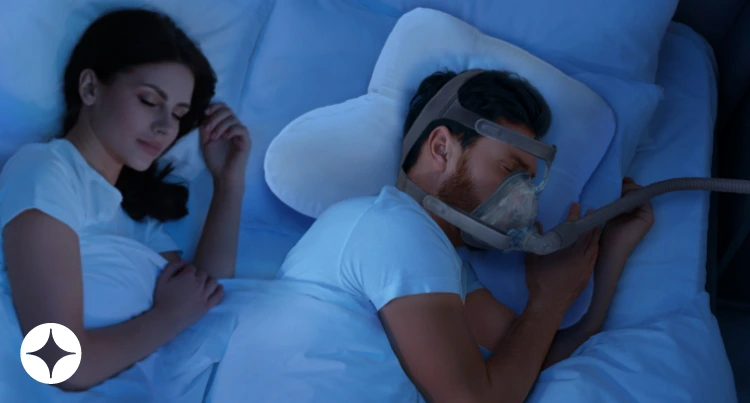
In the realm of sleep, there exists a delicate balance between restfulness and disorder. While many individuals effortlessly slip into a rejuvenating night's sleep, others find themselves grappling with persistent disruptions that impair their ability to rest adequately. Whether for you, or a loved one, dentifying and addressing sleep disorders, ranging from insomnia to sleep apnea, is critically important as it can have a significant impact one's health. [1] and overall quality of life.
Recognizing the Signs
Understanding the signs of sleep disorders is crucial for early detection and intervention. By recognizing these indicators, individuals can take proactive steps towards seeking appropriate treatment and reclaiming restful sleep.
- Loud snoring: Persistent and loud snoring, particularly when accompanied by gasping or choking sounds, may indicate obstructive sleep apnea (OSA), a condition characterized by intermittent pauses in breathing during sleep.[2]
- Gasping for air during sleep: Abrupt awakenings accompanied by a sensation of gasping for air can be indicative of sleep apnea, a potentially serious sleep disorder that requires medical attention.[2]
- Excessive daytime sleepiness: Feeling excessively tired during the day, despite spending adequate time in bed at night, may signal underlying sleep disturbances such as insomnia or sleep apnea.[3]
- Difficulty falling or staying asleep: Persistent difficulty initiating or maintaining sleep can be a hallmark symptom of insomnia, a common sleep disorder that can significantly impact overall well-being.[3]
- Involuntary leg movements: Restless leg syndrome (RLS), characterized by uncomfortable sensations in the legs and an irresistible urge to move them, can disrupt sleep and contribute to daytime fatigue and discomfort.[2]
The Impact of Untreated Sleep Disorders
Untreated sleep disorders can have far-reaching consequences that extend beyond mere fatigue and daytime sleepiness. Understanding the potential impacts of these conditions underscores the importance of seeking timely diagnosis and treatment.
- Increased risk of cardiovascular diseases: Sleep disorders, particularly sleep apnea, have been linked to an increased risk of hypertension, heart disease, and stroke.[4]
- Hypertension: Chronic sleep disturbances can elevate blood pressure levels, contributing to the development and progression of hypertension.[4]
- Diabetes: Poor sleep quality and untreated sleep disorders have been associated with insulin resistance and an increased risk of type 2 diabetes.[2]
- Cognitive impairment: Sleep disorders can impair cognitive function, including memory, attention, and decision-making abilities, leading to decreased productivity and an increased risk of accidents.[2]
- Mood disorders such as depression and anxiety: Chronic sleep deprivation and untreated sleep disorders can exacerbate existing mood disorders and contribute to the development of anxiety and depression.[2]
Pursuing Effective Treatment
If you’re experiencing any of these symptoms and suspect a sleep disorder, or just generally having trouble with your sleep, it’s a good idea to start a sleep journal[5] so that you can bring a list of symptoms, patters and sleep habits with you when you ultimately meet with your provider and consult with a healthcare professional specializing in sleep medicine. Diagnosis typically involves comprehensive evaluation, which may include sleep studies conducted in specialized sleep centers. Once diagnosed, treatment strategies tailored to the specific disorder can be implemented. For many individuals with sleep apnea, continuous positive airway pressure (CPAP) therapy represents a highly effective treatment modality. By delivering a steady flow of air through a mask worn during sleep, CPAP devices help maintain open airways, alleviating symptoms and promoting restorative sleep.[6]
The Role of CPAP Device Hygiene
As a leading provider in sleep equipment maintenance solutions, SoClean recognizes the critical role of proper device maintenance in supporting effective treatment outcomes. Regular cleaning, as recommended by the manufacturer and supplemental sleep equipment maintenance are essential for preventing bacterial growth [7] and promoting overall CPAP therapy comfort and success.
In summary, recognizing the signs, understanding the impacts, and pursuing effective treatment for sleep disorders are essential steps towards reclaiming restful nights and safeguarding overall well-being. At SoClean we’re committed to supporting individuals on their journey toward better sleep and improved quality of life.
References
- SoClean, New Research: Sleep Well to Live Longer, https://www.soclean.com/soclean3/sleep-talk/new-research-sleep-well-to-live-longer
- Cleveland Clinic, Sleep Disorders, https://my.clevelandclinic.org/health/diseases/11429-sleep-disorders
- Mayo Clinic, Sleep Disorders, https://www.mayoclinic.org/diseases-conditions/sleep-disorders/symptoms-causes/syc-20354018
- American Academy of Sleep Medicine, Eight Health Risks of Sleep Apnea, https://sleepeducation.org/eight-health-risks-of-sleep-apnea/
- SoClean, Honoring Sleep Awareness Week; How to Improve Your Sleep, https://www.soclean.com/soclean3/sleep-talk/sleep-awareness-week
- National Heart, Lung & Blood Institute, CPAP, https://www.nhlbi.nih.gov/health/cpap
- Harvard Health, Can Your CPAP Make You Sick? https://www.health.harvard.edu/blog/can-your-cpap-make-you-sick-2019100818005




